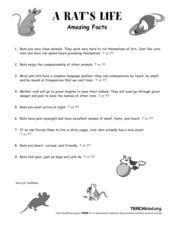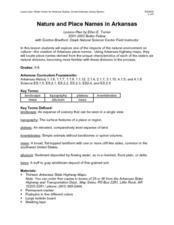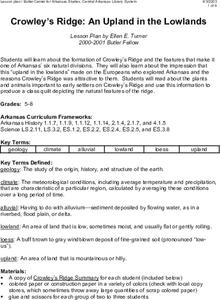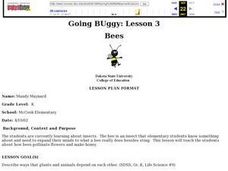Curated OER
Tall Tales
Students examine the characteristics of tall tales and how exaggerations are used. They create a character that is larger than life, they brainstorm attributes for their character, before writing a Tall Tale. They plan out their story,...
Curated OER
Wild and Wetlands
Upper graders identify the major characteristics of a wetland. They explore the human factors that change a wetland and write a descriptive paragraph about wetlands. This comprehensive activity also has an interactive "Watershed Game"...
Curated OER
A Rat's Life
Here is a two-page worksheet on rats and mice. Learners answer nine true/false questions about rats and mice, then compose answers to seven short-answer questions about these two rodents. Finally, they must compose a fictional story...
Curated OER
Crowley's Ridge: An Upland in the Lowlands
Young geographers examine how Crowley's Ridge was formed. This is one Arkansa's six natural geologic divisions. The history of Crowley's Ridge is important in that the first settlers of the state were attracted to this region, and it...
Curated OER
AP: Chapter 42: Circulation & Gas Exchange
Immerse biology learners in circulation and gas exchange for both simple organisms and higher animals. Six pages of short-answer questions and labelling of the human respiratory system are included. This assignment was written for an...
McGraw Hill
Arthropods
Are spiders related to crabs? Study the order of arthropods with a reading selection about animal diversity. It provides details about each class within the order, as well as vivid pictures and explanatory charts.
Curated OER
Explore the Arctic: A Scavenger Hunt
Students explore the Arctic region using the internet. They identify characteristics of animals that live in the Arctic and locate the Arctic region using a map of the United States.
Curated OER
Elephant Earth Adventures . . .
In this reading comprehension about African elephants worksheet, learners read factual passages about their physical characteristics, amazing facts, tusk uses, ears, trunk, skin, movement, food needs, extended families, and the active...
Curated OER
Where Has It Been? Tracking the Ivory-Billed Woodpecker
By studying the assumed extinction, and subsequent rediscovery of the Ivory-billed Woodpecker, learners use maps and come up with a scenario for the rediscovery of the bird. This incredibly thorough lesson plan is chock-full of...
Chicago Botanic Garden
Migration, Adaptation, and Changing Climates
It is easy for humans to adapt to changing environments, but how do animals and plants do it? Classes discuss how plants and animals deal with environmental changes in the second of seven lessons. Through questions and discussions,...
Curated OER
Horse Character: Ceramics Lesson
Animals oftentimes elicit various characteristics which make them symbolic or representative of human feeling, action, or emotion. The class creates horse characters out of clay to show character action and symbolism. This is a great...
Curated OER
Tables
Can you read this table? Learners begin to comprehend data analysis through examining two simple tables and answering comprehension questions. The first gives characteristics about three animals in yes-or-no format (i.e. "eats insects,"...
Curated OER
Nature and Place Names in Arkansas
Middle schoolers examine the way that many place names in Arkansas came to be. By looking at Arkansas highway maps, they find names that come from the characteristics of each of the state's six geographical divisions. This interesting...
Curated OER
Crowley's Ridge: An Upland in the Lowlands
This clever lesson combines elements of geography, art, literature, and storytelling. Pupils take a close look at the six geographical regions of Arkansas, and pay close attention to Crowley's Ridge - which is one of the six. In groups,...
Sargent Art
Rainforest Mural
Whether you are an art teacher or a teacher looking for a great project to finish off a unit on the rainforest, this instructional activity is for you. Here are some great teaching tips and instructional practices that can help you and...
Curated OER
Compare the Presidents
How are Nicolas Sarkozy and Barack Obama similar? How are they different? Look at two visual representations of them; what kind of first impression does they give you? After comparing the presidents, learners complete a proverb matching...
Curated OER
Manatee Vocabulary
In this manatee instructional activity, students explore the characteristics of the manatee. Students match the correct word to each of the ten facts about manatees.
Curated OER
The Chordates
Students study the characteristics of organisms that are a part of the phylum Chordata. In this organisms lesson students identify mammals that are native to Saskatchewan.
Curated OER
One Grain at a Time
Middle schoolers investigate deserts. In this geography lesson, students create a KWL chart about deserts and research information on deserts by using reference books. Middle schoolers record the characteristics of deserts and the...
Curated OER
Investigation 9 - Bird Study
Fourth graders examine specific bird characteristics and become more aware of the ecosystems that support each bird. They engage in bird walks, mapping the areas where they find evidence of bird activity.
Curated OER
Animals Galore
Third graders use structural characteristics to sort and classify animals into groups.
Curated OER
Who's Who?
Students explore biology by identifying animals and their environments. In this animal characteristic instructional activity, students read assigned text about farm animals, how they are raised, and what they are used for in our society....
Curated OER
Going Buggy: Lesson 3: Bees
Students review the characteristics of insects they have already been introduced to. As a class, they are introduced to the characteristics of bees and what it can do instead of sting. To end the lesson, they discuss how plants and...
Curated OER
Is Our Water Healthy?
Students test water for a least one chemical characteristic. They hypothesize how a storm event might change the chemical characteristics of a stream. Students collect water samples and use the chemical test to test the water.

























